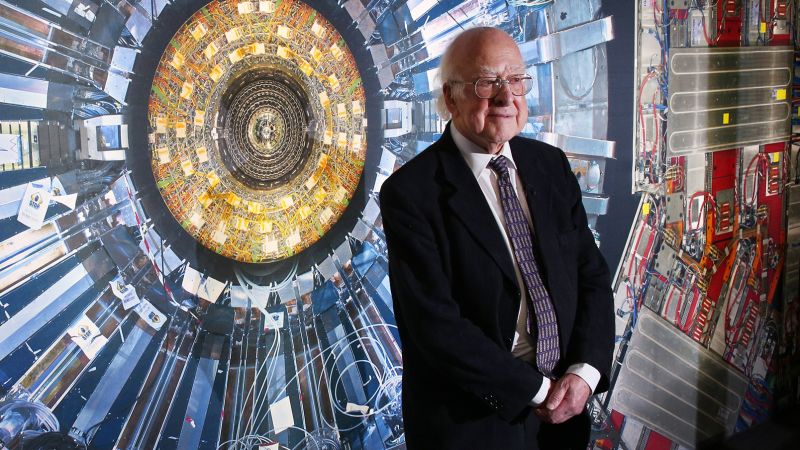Peter MacDiarmid/Getty Images
The late physicist Peter Higgs stands in front of an image of the Large Hadron Collider in the “Collider” exhibition at the Science Museum in November 2013, in London.
London
—
Physicist Peter Higgs, whose theory of an undiscovered particle in the universe changed science and whose Nobel Prize-winning discovery was confirmed half a century later, has died at the age of 94, the University of Edinburgh said on Tuesday.
The discovery of the Higgs boson in 2012 at a CERN research center near Geneva was widely hailed as the biggest advance in knowledge about the universe for more than 30 years, moving physics toward ideas that were previously science fiction.
“For me personally, this is just confirmation of something I did 48 years ago, and it gives me great pleasure to be proven right in some way,” the British scientist told Reuters at the time.
“At first, I didn't expect that I would still be alive when it happened.”
The University of Edinburgh, where Higgs held a professorship for many years, said he died peacefully on Monday at his home after a short illness.
Professor Sir Peter Matheson, Provost and Vice-Chancellor of the University, said: “Peter Higgs was a remarkable person, a truly gifted scientist whose vision and imagination enriched our knowledge of the world around us.”
Higgs described himself as an “incompetent” in the school's physics laboratory and initially preferred mathematics and chemistry. But inspired by quantum physicist Paul Dirac, who attended the same school, he went on to specialize in theoretical physics.
What became known as the Higgs boson would solve the mystery of where many fundamental particles derive their mass: by interacting with the invisible “Higgs field” that propagates through space.
This interaction, known as the Brot-Englert-Higgs mechanism, led to the Higgs and Belgian François Englert winning the Nobel Prize in Physics in 2013. Robert Brot, who was Englert's assistant, died in 2011.
In 1964, the first Higgs paper on the model was rejected by an academic physics journal at CERN as having “no relation to physics.” His revised paper, although published weeks after Englert and Brot's research, was the first to explicitly predict the existence of a new particle.
“Over the weekend… I gradually realized that I knew two things that needed to be combined,” he said. “I had to go back to my office on Monday and make sure I didn't do anything wrong about this.”
This tantalizing insight promised to fill a gap in the Standard Model – the basic theoretical framework of physics – if only the existence of the particle could be proven.
For nearly three decades, physicists at CERN and Fermilab in Chicago have replicated the “Big Bang” by smashing particles together, hoping to glimpse the Higgs boson in the resulting mini-bursts.
CERN's Large Hadron Collider It was finally proven to be the hammer needed to crack a nut, and in 2012, two experiments there independently found the Higgs boson.
Englert and Higgs were in the packed hall at CERN to hear the discovery announcement, while hundreds of thousands watched online.
“We have reached a turning point in our understanding of nature,” Rolf Heuer, Director-General of the European Organization for Nuclear Research, said to thunderous applause.
“It's unbelievable that this could happen in my lifetime,” Higgs, looking confused and wide-eyed, told his fellow researchers.
The Higgs boson completes the Standard Model, but its full understanding is still a work in progress. His discovery allowed theorists to turn their attention to the large portion of the universe that remained unexplained, as well as esoteric ideas such as the possibility of parallel universes.
The Higgs was an atheist, and hated the nickname “God particle,” often given by writers to the boson that bears his name.
He had strong views about what was good and bad in science, and resigned from the Nuclear Disarmament Movement when it began campaigning against the harnessing of nuclear energy.
In 1962, Higgs married Jody Williamson, an American linguist and nuclear disarmament activist, who died in 2008. They had two sons.
Higgs was modest about his accomplishments and media-shy. In an interview on the Nobel Prize website, he recounted how on the morning the 2013 Nobel Prize was due to be announced, he anticipated media attention and took steps to avoid it.
He left his home in Edinburgh, where he was an honorary professor at the university, and went for a walk around the harbour, followed by lunch and an art exhibition.
On his way home, one of his former neighbors congratulated him on his award.
“I said, ‘What prize?’” he recalls, laughing.
(Reporting by Robert Evans and Tom Miles) – Additional reporting by Farouk Suleiman – Prepared by Muhammad for the Arabic Bulletin – Prepared by Muhammad for the Arabic Bulletin Editing by Praveen Char and Mark Heinrich

“Typical beer advocate. Future teen idol. Unapologetic tv practitioner. Music trailblazer.”






More Stories
NASA’s Perseverance rover has found a rock on Mars that may indicate ancient life.
Northern Lights May Shine in Some States Tonight
NASA Releases Never-Before-Seen Images of the Peacock Galaxy 25 Years After Chandra X-ray Observatory Launch